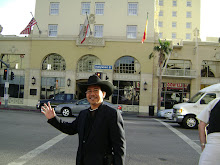Today's readings are easy to remember. The first reading is from Solomon's experience with God Who asked him what he wanted. Solomon, realizing the weight of David's legacy on his youth (David being the greatest King Israel ever knew), as well as the fact that his mother was Bathsheba whose husband Uriah David had ordered killed, must have found himself in utter helplessness. Not asking to be born into this situation, yet he must rule amidst any controversy for the good of Israel, Solomon asked for an understanding heart. God thus bestowed on him the wisdom none has ever had and may ever have. Note that God was particularly struck that Solomon did not ask for riches or power or even the life of his enemies. Solomon really seemed in search for that which can truly make him happy. And God granted him way beyond what he could ever ask for.
The second reading quotes St. Paul's "Everything works for the good of those who love Him." This message of St. Paul becomes an overarching principle in God's generosity.
The Gospel has three parables about the Kingdom of God. The first is about a man who found a hidden treasure which he buried again and bought back after selling everything he owned. He must have realized that such a treasure was of such a value that it was worth everything he owned, hence his investment to own that piece of land where the treasure was. The second parable is on the Pearl of Great Price which the man found and also bought with everything that he had. These two parables alone speaks about the value of the Kingdom - that it is that essential such that nothing can compare with it. Everything else counts as nothing before these treasures. The third parable is about the net that was thrown into the sea catching as much as it could, and at the shore, the fishermen collected the ones that were good and threw away those that were useless. This last parable has an eschatological dimension in it. There will be on the last period of all life a judgment such that those who do evil shall be thrown away while those who've done good shall be collected into eternal life.
Fr. Munachi's homily today mentions that of the summum bonum or the highest good to which all other goods gel together like the hen that can gather all chicks together. I am always reminded of the figures 1 and 0 every time these two parables of the Kingdom are mentioned. 0 stands for all that perishes and vanishes, and 1 for God. If we choose only the material, only those that vanish in death, we choose 0; no matter how many zeroes we choose ahead of God will lead us with nothing at the end. However, if we choose God first, all the zeroes that come after Him will only make us richer.
Indeed, God seems to be asking each and every one of us what is it that we would like to have? Like the question he asked Solomon, He also breaks for us this question: what shall make us happy? What is our highest good? What is it that our hearts seek for? If our hearts love God first, then everything else we so choose or seek for will only make us even better. Seek first the Kingdom of heaven, and all the rest will fall in line, as the song goes.
Reversing the Parable
It just dawned on me: has God made humanity created in His image and likeness something like the Pear or the Hidden Treasure? When I look at the Crucifix and the sacrifice He made if only to gather us back unto Himself, I realize the meaning of these parables of the Kingdom. We must have been so important, our salvation so imperative that He had to sacrifice even His divinity if only to own us back. Think about it.
God bless
Sunday, July 27, 2008
Subscribe to:
Comments (Atom)

